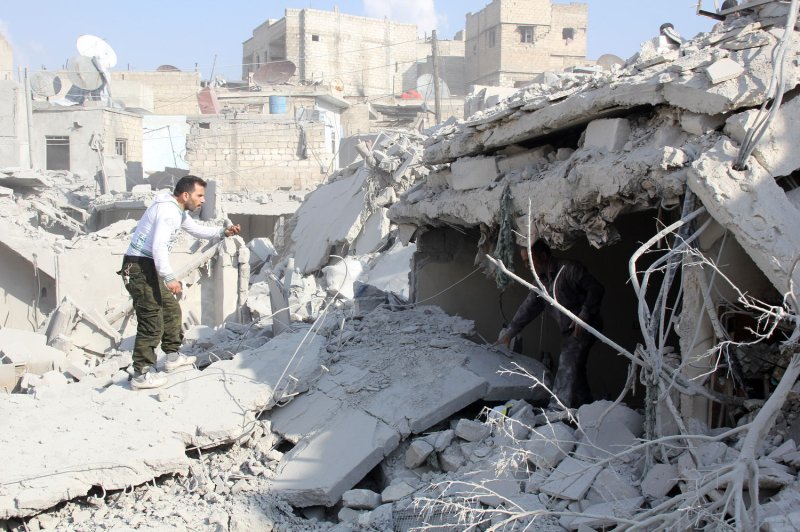A Syrian man looks for survivors under the rubble of destroyed houses on October 30, 2015, following what local activists say was an airstrike by Russian aircraft in the rebel-held area of Kallasah, on the outskirts of Aleppo, Syria. Wednesday, peace talks aimed at ending the five-year civil war were suspended until Feb. 25. File Photos by Ameer Alhalbi/ UPI |
License Photo
GENEVA, Switzerland, Feb. 3 (UPI) -- After several days of meetings, negotiators involved in Syria's peace talks won't gather again until later this month, the U.N. special envoy to the talks said Wednesday.
Staffan de Mistura, the diplomat overseeing the discussions, suspended the talks and said Wednesday that more work clearly needs to be done before the two sides approach anything resembling an agreement.
"I have concluded frankly that after the first week of preparatory talks there is more work to be done, not only by us but the stakeholders," he said. "I have indicated from the first day I won't talk for the sake of talking."
The suspension of talks until Feb. 25 came after a government assault on rebel installations in Aleppo, Syria. Negotiators representing the regime of President Bashar Assad and opposition forces began the talks last Friday.
De Mistura emphasized that the interruption in the peace talks is temporary and does not signal a failure.
"They came and they stayed. Both sides insisted on the fact that they are interested in having a political process started," he said.
Rebel representatives did not appear for a schedule meeting Tuesday, instead opting to gather outside the U.N.'s Geneva, Switzerland, office to protest the "massive acceleration" of government attacks, supported by Russian airstrikes, on sites in the cities of Homs and Aleppo.
More than a quarter million people have been killed in Syria's civil war, which started in 2011. Since then, U.S. officials have taken sides with the rebels while the Russian government has sided with Assad's regime.
Although all sides are united in fighting terrorism in the country, the logistics of doing so and other integrated elements in the fight have created tension between both sides, particularly Russia and the United States.
Wednesday's assault is "unprecedented. We've never seen anything like this," opposition delegate in Geneva, Hind Kabawat, said. His colleague, Faid Atassi, said, "The targets, as always, are overwhelmingly civilians. The [Syrian] regime's and Russia's actions gravely threaten the political process" urging action "to ensure the credibility of this process."
Government forces overran the town of Hardatnin, north of Aleppo, threatening rebel supply lines between Aleppo and the Turkish border, before unleashing the attacks on rebels within the city, the Syrian Observatory for Human Rights said.
Opposition delegates have asked for a cease-fire, or at least a reduction in hostilities, before peace talks in Geneva can begin in earnest. Mediator de Mistura himself proposed such an agreement in the first days of the process, telling the BBC., "The level of trust is close to zero between the two sides. A ceasefire for me is essential. In fact it is the test that shows the talks are successful."















